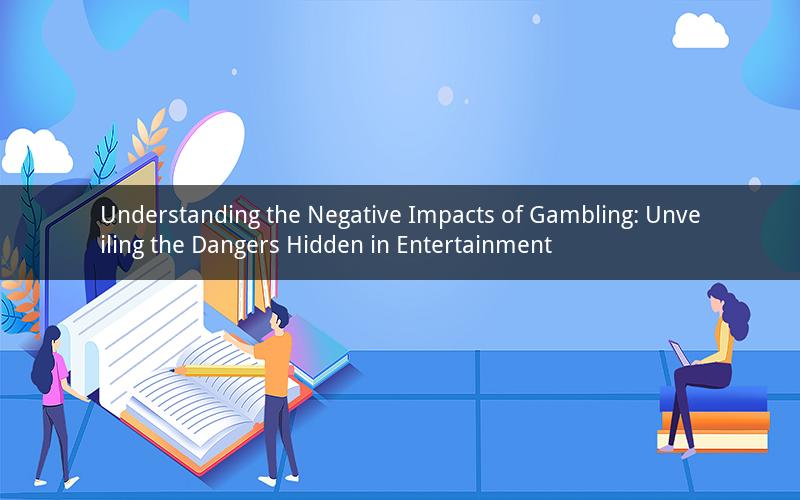
Gambling has long been a topic of debate, with many arguing about its benefits and drawbacks. While it is true that gambling can provide excitement and entertainment, it also has numerous negative consequences that cannot be ignored. In this article, we will delve into the various cons of gambling and shed light on the dangers lurking behind the glitz and glamour.
1. Financial Problems
One of the most immediate and severe consequences of gambling is the potential for financial ruin. Many individuals who engage in gambling activities are unaware of the risks involved and may end up losing a significant amount of money. This can lead to debt, financial instability, and even bankruptcy. Additionally, some gamblers may resort to stealing or committing fraud to fund their gambling habits, further complicating their financial situation.
2. Emotional and Psychological Issues
Gambling can have a detrimental impact on an individual's mental health. The thrill of winning can create a sense of euphoria, but the subsequent losses can lead to depression, anxiety, and other psychological issues. Compulsive gambling, also known as gambling addiction, is a serious condition that can cause significant emotional distress and relationship problems. Individuals struggling with gambling addiction may experience intense cravings, irrational decision-making, and a strong urge to keep gambling despite negative consequences.
3. Family and Social Consequences
Gambling addiction can have severe consequences for an individual's family and social life. Relationships may suffer as a result of financial problems, lying, and secrecy surrounding the gambling habit. Spouses, children, and other family members may feel betrayed, ignored, or abandoned as the individual's gambling addiction takes precedence over their personal lives. Furthermore, individuals with gambling problems may experience social isolation, as they may feel ashamed or embarrassed to seek help or share their struggles.
4. Legal and Criminal Consequences
Gambling addiction can lead to legal and criminal consequences. Individuals who cannot control their gambling may engage in illegal activities, such as fraud, theft, or embezzlement, to fund their habits. This can result in fines, imprisonment, and a criminal record that can have long-lasting effects on their future employment opportunities and social standing. Moreover, individuals involved in gambling-related criminal activities may harm others or become victims themselves.
5. Impact on Public Health
Gambling can have a negative impact on public health, particularly when it leads to increased alcohol and drug abuse. Many individuals who engage in gambling may turn to alcohol or drugs as a means to cope with their gambling-related stress or anxiety. This can exacerbate mental health issues and lead to other health problems, such as liver disease, heart disease, and addiction to other substances.
Now that we have explored some of the cons of gambling, let's address five frequently asked questions about this controversial topic.
Question 1: Can gambling addiction be treated?
Answer: Yes, gambling addiction can be treated, just like any other addiction. Treatment may involve therapy, support groups, and in some cases, medication. The key is to seek help and support from professionals who specialize in addiction and mental health.
Question 2: Is online gambling safer than land-based casinos?
Answer: Online gambling is not necessarily safer than land-based casinos. Both have their risks, and the key to responsible gambling is to set limits and stick to them. Online gambling can be more accessible, which may increase the risk of developing a gambling addiction.
Question 3: Can gambling contribute to suicide?
Answer: Yes, gambling can contribute to suicide, especially in individuals with a pre-existing mental health condition or a strong gambling addiction. The financial, emotional, and social consequences of gambling can lead to feelings of hopelessness and despair, which may result in self-harm or suicide.
Question 4: How can I recognize the signs of gambling addiction in a loved one?
Answer: Signs of gambling addiction include hiding gambling activities, lying about gambling habits, increased financial problems, and neglecting personal and professional responsibilities. If you suspect that a loved one may have a gambling addiction, it's essential to approach the situation with sensitivity and support.
Question 5: Are there any benefits to gambling?
Answer: While the cons of gambling far outweigh the benefits, some individuals may experience positive outcomes, such as socialization, excitement, and the occasional win. However, it is crucial to approach gambling with caution and prioritize responsible gaming practices.
In conclusion, gambling may seem like an enjoyable pastime, but its cons cannot be overlooked. Understanding the potential negative impacts of gambling can help individuals make informed decisions and take steps to mitigate the risks associated with this controversial activity.